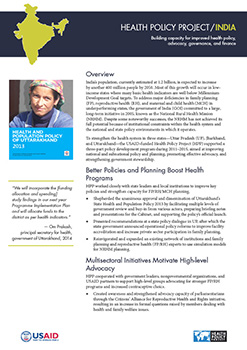The Health Policy Project ended in 2016. Work continued under Health Policy Plus (HP+) until 2022.
India

Country & Regional Programs
- ► Africa
- ► Asia and the Middle East
- ► Europe and Eurasia (E&E)
- ► Latin America and the Caribbean (LAC)
Overview
With a current population of about 1.2 billion people and continued population growth, India is expected to surpass China by 2030 and become the world’s most populous nation. India’s National Population Policy recognizes the need to address population growth in order to maintain the steady increases in social and economic development, and the Government of India (GOI) is committed to expanding effective family planning/reproductive health (FP/RH) services throughout the country.
What We Do
In India, the Health Policy Project’s (HPP) primary objective is to support the government’s commitment to expand access to FP/RH by strengthening the capacity of individuals and institutions at the national level and in three high priority states—Uttar Pradesh, Uttarakhand, and Jhakarkand. This assistance helps GOI to sustain its momentum in creating a supportive policy environment that improves health equity and the delivery of FP/RH services. HPP’s capacity-building efforts focus on evidence-based policy decisionmaking, decentralized planning and implementation efforts, monitoring policy commitments, and financing for FP/RH in India.
The HPP program in India has three components:
Strengthen Capacity for Evidence-based Decisionmaking at State Level
HPP collaborates with state-level health institutions to analyze policies and effectively plan, implement, and monitor FP/RH programs. The project collaborates with these organizations to design suitable capacity-building approaches that foster a proactive role in annual health program planning and monitoring, and improved communication among national, state, and district levels.
Improve Advocacy Efforts to Enhance Family Planning Programs
HPP works with Jansankhya Sthirata Kosh (JSK), or the National Population Stabilization Fund—a national organization that promotes and implements activities to galvanize India’s effort to stabilize population growth. As an autonomous organization with all Indian state governments as its members, JSK is a key institution for sustaining and strengthening advocacy efforts at national and state levels. HPP supports JSK staff members to help them develop a long-term FP/RH advocacy plan. JSK will use outputs from advocacy tools and models, such as DemProj, RAPID, Famplan, and other evidence-based methods, to improve its ability to engage members of Parliament and other audiences, and advocate for greater support for FP/RH programs.
Strengthen Capacity of National Health Policy Unit
HPP is supporting the National Institute of Health and Family Welfare (NIHFW) to set up a Policy Unit to institutionalize leadership to undertake systematic and concerted efforts to rejuvenate FP programs through evidence-based advocacy and policy dialogue. HPP will provide technical assistance and build capacities of the Policy Unit to promote evidence-based policy analysis, advocacy, and multisectoral coordination. The Policy Unit will also help create a network of informed champions among senior political and administrative leaders at national and state levels to promote appropriate health, nutrition, and population development strategies. In addition, HPP works to strengthen the ability of select State Institutes of Health and Family Welfare to play a greater role in evidence-based policy analysis, advocacy, and coordination across multiple sectors.
Recent Progress and Achievements
- In 2010, the Health Policy Initiative (HPI) assisted the Government of Uttarakhand in developing a new Health and Population Policy, which was approved by the Department of Health and Family Welfare. Building on this work, HPP is collaborating with the Secretary of Health and Family Welfare to facilitate the Cabinet approval process.
- HPP conducted a rapid capacity assessment of government health institutions in Uttarakhand to identify needs and current practices. Similar assessments will be undertaken in Uttar Pradesh and Jharkand.
- HPP has developed locally relevant methodologies and training tools to build capacities of key district stakeholders in four priority districts of Uttarakhand, which includes training chief medical officers in strategic planning and decisionmaking to improve FP/RH service delivery.
Publications and Resources
RAPID Population & Development - India (PDF)
Common Advocacy Plan for Expanding Contraceptive Choice in India
News
Health Policy Project India Supports Successful World Population Day Events
National Institutes Use Computer Software Models to Evaluate Health and Family Planning Options
Parliamentarians Join Forces for Reproductive Health in India
Partners
HPP collaborates with a range of in-country and international partners in India, including:
- District Health and Family Welfare Departments of Simdega, East Singhbhuam, and Giridh
- Jansankhya Stritha Kosh (JSK)
- Ministry of Health and Family Welfare (MOHFW)
- National Institute of Health and Family Welfare (NIHFW)
- National Rural Health Mission (NRHM )
- State-level OFHWs (Uttar Pradesh, Uttarakhand, Jharkhand)
- State Family Planning Cell, Jharkhand


